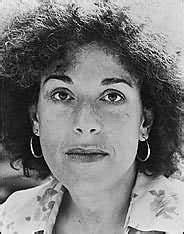A Quote by Judith Perelman Rossner
He always said she was smart, but their conversations were a mined field in which at any moment she might make the wrong verbal move and find her ignorance exploding in her face.
Related Quotes
For a moment she turned in a circle, staring at her hands, which she held high and useless, close to her breast. She bobbed and shambled like an ape doing a trick, and her face was the silly, bewildered face of a joker's victim. And yet she could make no move that was not beautiful. Her trapped terror was more lovely than any joy that Molly had ever seen, and that was the most terrible thing about it.
She bent her finger and then straightened it. The mystery was in the instant before it moved, the dividing moment between not moving and moving, when her intention took effect. It was like a wave breaking. If she could only find herself at the crest, she thought, she might find the secret of herself, that part of her that was really in charge. She brought her forefinger closer to her face and stared at it, urging it to move. It remained still because she was pretending... . And when she did crook it finally, the action seemed to start in the finger itself, not in some part of her mind.
As he was about to leave, she said, "Murtagh." He paused and turned to regard her. She hesitated for a moment, then mustered her courage and said, "Why?" She though he understood her meaning: Why her? Why save her, and now why try to rescue her? She had guessed at the answer, but she wanted to hear him say it. He stared at her for the longest while, and then, in a low, hard voice, he said, "You know why.
She sat leaning back in her chair, looking ahead, knowing that he was as aware of her as she was of him. She found pleasure in the special self-consciousness it gave her. When she crossed her legs, when she leaned on her arm against the window sill, when she brushed her hair off her forehead - every movement of her body was underscored by a feeling the unadmitted words for which were: Is he seeing it?
What have the nibblers ever done for you?" The breeze ruffled her hair, pushing it back from her face, giving him a clear shot of her eyes. They were asking for an answer. Needing to know if she could count on him. "They saved your life," he said. And for just a moment, Luxa's face softened and she smiled.
Rhoda comes now, having slipped in while we were not looking. She must have made a tortuous course, taking cover now behind a waiter, now behind some ornamental pillar, so as to put off as long as possible the shock of recognition, so as to be secure for one more moment to rock her petals in her basin. We wake her. We torture her. She dreads us, she despises us, yet she comes cringing to our sides because for al our cruelty there is always some name, some face which sheds a radiance, which lights up her pavements and makes it possible for her to replenish her dreams.
She realized how many of her beliefs were either unrealistic or belonged to her deceased parents and her ex-husband. She also realized that her expectations for herself and others were sometimes too rigid. She was trying to live up to what everyone else said was best for her, which made her depressed and hard to be around at times. Once she changed her beliefs about herself and others, she began to smile more and enjoy life.
She didn't give George any too easy a time when she was alive. She was one of those semi-invalids – I believe she had really something wrong with her, but whatever it was she played it for all it was worth. She was capricious, exacting, unreasonable. She complained from morning to night. George was expected to wait on her, hand and foot and everything he did was always wrong and he got cursed for it. Most men, I'm fully convinced, would have hit her with a hatchet long ago.
And then she said nothing else, for Henry put his arms around her and kissed her. Kissed her in such a way that she no longer felt plain, or conscious of her hair or the ink spot on her dress or anything but Henry, whom she had always loved. Tears welled up and spilled down her cheeks, and when he drew away, he touched her wet face wonderingly. "Really," he said. "You love me, too, Lottie?
Just like Marilyn Monroe is a lot of girls' idol, that's how I feel about Dorothy Dandridge. And she any Marilyn were very close friends. She went through a lot, and people told her that she couldn't do certain things, but she didn't let that bother her. She said in her mind that she was going to do them and that nothing was impossible, and she did it. It was so sad... She died from drugs, and drinking as well.
The good enough mother, owing to her deep empathy with her infant, reflects in her face his feelings; this is why he sees himselfin her face as if in a mirror and finds himself as he sees himself in her. The not good enough mother fails to reflect the infant's feelings in her face because she is too preoccupied with her own concerns, such as her worries over whether she is doing right by her child, her anxiety that she might fail him.




































